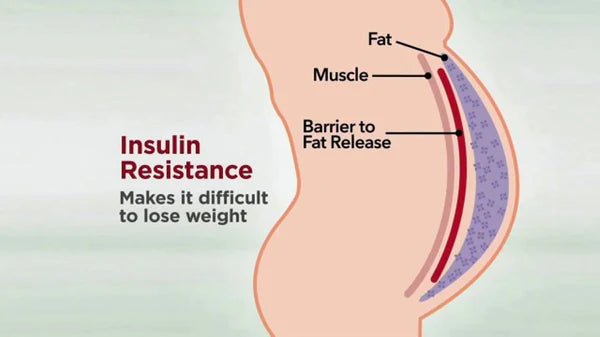If you’ve tried restrictive diets that “should” work but don’t, you are not alone. Most research agrees that diets based on calorie restriction fail, even for the most diligent and dedicated participants. This is because calories and weight loss are more sophisticated than the addition/subtraction rules behind many diet programs. Weight loss can be influenced by the microscopic characteristics of your cells and your body’s messengers – the hormones. You may need to consider the relationship between insulin resistance and weight loss.
What is Insulin?
Many people know insulin as the hormone that responds to glucose in the blood. But insulin is important for more than just that. Insulin also helps build muscle, helps electrolytes keep blood pressure in balance, and even helps support brain functions for learning and memory.
What is Insulin Resistance?
Insulin resistance starts out as too much insulin, which is often released to manage glucose from the diet, but also in response to stress. If the levels of insulin stay high constantly and over time, the cell will attempt to dampen the response to meet its needs by reducing the number of gates available for glucose to pass through, thus creating the state of insulin resistance. This means the circulating glucose isn’t used for energy. The glucose must go somewhere, so it’s placed in the fat cells as a triglyceride to be stored for later. As fat cells grow with more stored triglycerides, they can also develop their own insulin resistance.
Remember, this is in response to glucose and insulin and not calories. So, when insulin is rising, body fat will increase, even though the number of calories may stay the same or even drop.

How Do I Know If I am Insulin Resistant?
You can’t exactly feel insulin resistance, and it doesn’t occur suddenly, so you might not know if you have it. Signs of insulin resistance might be:
- Waist circumference equal to or greater than the hip circumference
- Extreme thirst or hunger
- Increased urination
- Feeling more tired than normal, especially after a meal
How Do You Lose Weight if You are Insulin Resistant?
How your body responds to insulin is partly due to your age & genetics, but also things you can control, such as stress and intakes of simple carbohydrates and sugars. When it comes to weight loss with insulin resistance, it doesn’t work to simply reduce calories. Instead, you’ll have a better chance at meeting your goals by making some manageable changes to your diet and lifestyle that support insulin sensitivity for your cells.
Diet Changes to Support Insulin Resistance
Reduce your intake of processed grains. Bread, pasta, and crackers will raise glucose, and therefore insulin, more than whole grains like rice, amaranth, or quinoa.
Avoid snacking between meals. Eating throughout the day keeps insulin constantly circulating around the cells.
Boost fibers in your diet from fruits and vegetables, beans, and whole grains. Fiber will improve satiety and make you feel full longer, so you’ll be less likely to want to snack between meals.
Use fasting wisely and deliberately. If you want to try fasting, start with at least getting 12 hours of fasting overnight between dinner and breakfast. There are many fasting programs, and their success depends on finding the right one for you. We can help if you’re not sure how to get started.
Avoid concentrated fructose and sucrose. Foods and drinks that contain concentrated sources of fructose, like corn syrup, high fructose corn syrup, or sucrose – such as some fruit juices, soda, candy, or ice cream – have been shown to increase insulin resistance.
What Are Some Lifestyle Changes One Can Make to Reverse Insulin Resistance?
Make sure you’re getting enough sleep. When you’re not rested, the body struggles to respond to stress and increases cravings for more glucose to meet perceived energy demands for fight & flight.
Balance stress. All kinds of stress promote insulin to make you ready to fight or run away. Balancing stress with breathing, meditation or yoga will help with insulin sensitivity.
Move your body. Even if you have to sit a lot during the day, try to move by standing, walking around your space, or flexing your muscles. Exercise regularly and with increasing intensity. Building more lean muscle will help clear glucose.

